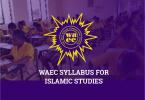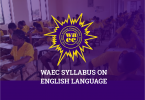If you are getting ready to write Yoruba in the 2025 WAEC exam, this guide will be of great help. The WAEC Syllabus for Yoruba is crafted to show you exactly what to study, from grammar and literature to culture and oral traditions. Understanding this syllabus will help you focus your reading and boost your chances of passing with confidence.
This article will serve as a guide showing you everything you need to know regarding the WAEC Syllabus for Yoruba for 2025. Ensure you read the information provided in this article carefully to be guided. Go through this article to effectively prepare for your exams and gain a better appreciation of the Yoruba language and culture!
WAEC Syllabus for Yoruba 2025
The Yoruba WAEC Syllabus for 2025 is going to serve as a guide to enhance proficiency in speaking, reading, and writing Yoruba and familiarize students with the sound system, grammar, and structure of the Yoruba language. Go through this article to deepen your understanding of Yoruba literature, culture, and traditions.
Examination Structure
The Yoruba examination comprises two papers:
Paper 1: Objective Section
- Duration: 1 hour
- Marks: 60
Sections:
- Section A: Language (Comprehension, Composition, Sound System, Grammar, Translation)
- Section B: Literature (Oral and Written)
- Section C: Culture (Customs and Institutions)
Paper 2: Essay Section
- Duration: 2 hours
- Marks: 100
Section A: Language (Composition, Sound System, Grammar)
Composition: Write a 300-word essay on a given topic.
Sound System:
- Vowels, Consonants, Syllabic Nasals
- Phonetic and Phonemic Classification
- Syllable Structure
- Sound Processes (e.g., vowel harmony, assimilation)
- Tone and Notation
Grammar:
- Word Structure and Formation
- Numerals (Basic and Derived)
- Word Classes (Nouns, Verbs, Adjectives, etc.)
- Sentence Structures and Types
Section B: Literature (Oral and Written)
Oral Literature:
- Prose, Poetry, Drama
- Study of set books with one question per genre
Written Literature:
- Prose, Poetry, Drama
- Study of set books with one question per genre
Section C: Culture (Customs and Institutions)
Customs:
- Traditional Dressing and Adornments
- Indoor and Outdoor Games
- Naming Ceremonies
- Home Training (Respect, Discipline, Hard Work)
- Yoruba Foods
- Non-verbal Communication
- Funerals (Traditional and Modern)
- Inheritance Systems
Institutions:
- Traditional Occupations
- Marriage Customs
- Political Structures (Chieftaincy, Kingship)
- Child Upbringing
- Yoruba Spiritual Beliefs (Olodumare, Deities)
- Influence of Modern Religions (Islam, Christianity)
- Yoruba Economy (Cooperatives, Money Lending)
Recommended Textbooks
Language:
- Abiodun, Jibola – Aroko Ati Aayan
- Owolabi, K. – Ijinle Itupale Ede Yoruba
- Bamgbose, A. – Fonoloji Ati Girama Yoruba
Oral Literature:
- Ojo, Olagoke – Ijapa Tiroko Oko Yannibo
- Abimbola, Wande – Awon Oju Odu
- Ogunniran, L. – Eegun Alare
Written Literature:
- Eso-Oluborode, Sunday – Olorunsogo
- Olayiwola, Ademola – Akowe ko wura
- Awe, Debo – Apoti Alakara
Culture:
- Adeoye, C.L. – Asa Ati Ise Yoruba
- Olajubu, O. – Iwe Asa Ibile Yoruba
- Daramola, A. & Jeje – Asa Ati Orisa
Conclusion
The WAEC Yoruba syllabus is your complete guide to succeeding in the exam. By studying each part carefully and using the right textbooks and practice methods, you will be well-prepared to write and speak Yoruba clearly and confidently. To do well in the WAEC Yoruba exam, make sure you understand what is in the syllabus. Practice speaking, reading, and writing in Yoruba every day. Use the textbooks recommended to study better.
We hope you found this helpful. Stay informed about any updates to the WAEC syllabus for Yoruba and the exam. Following these steps will help you prepare well and pass the exam with confidence. For further inquiries, do not hesitate to visit the comment section!







Leave a Comment